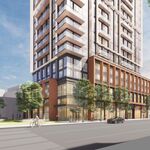Yes and no. Our tax structure is marginally higher, but that negates that our governments run large surpluses while Americans run large deficits. Overall, the recent KPMG report on global tax competitiveness ranked Toronto as the 7th most competitive city worldwide (Mtl. Van. Monterrey and some Latin American cities beat us).
http://www.kpmg.ca/en/services/tax/documents/CompetitiveAlternativesFocusonTaxFINAL.pdf
That KPMG report is referring to Toronto CMA, similar to the GTA. Not Toronto proper (the 416) by itself. On many fronts Toronto is the sick man of the CMA.
From Mayor Miller:
It started as a whisper, “Did you hear, that multi-national software company just announced a major investmentâ€â€“ but it wasn’t in Toronto. We shrugged and life went on. Next, there was an occasional article in the daily paper, “Major corporations merge to expand market-share†– but it wasn’t in Toronto. We shrugged and life went on. Until, finally, the whispers became a roar and suddenly everyone was talking about employment sprawl, traffic congestion, and under-employment in Toronto. If we continue to shrug and ignore these warning signs of economic decline, we do so at our peril. As members of the Mayor’s Economic Competitiveness Advisory Committee, we, like many other Torontonians, are noticing some disturbing trends in our city. The economic success that characterized Toronto during the latter half of the twentieth century has become a historical fact rather than a constant characteristic of our city. We’ve seen other cities that years ago were playing catch up to our lead, surpass us in terms of economic growth.
Without continued economic growth, no city can maintain and attract investment, including highly mobile capital and labour. The worst thing we can do is to do nothing. If the status quo continues, we risk being caught in a downward economic spiral of higher taxes, declining services, loss of jobs and less prosperity.
The bad news is that the job growth is happening in the region surrounding Toronto, not in the city itself. This means that while more and more people live in Toronto, increasingly, they must travel, usually by car, to jobs outside the city. And, it shouldn’t come as a surprise then that because of the employment boom outside of Toronto, that median household income in the Toronto region is higher than within the City of Toronto itself, where over the twenty year period of 1980 to 2000 the number of low-income households increased from 18 per cent to 22 per cent of all households in the city.
Employment growth within the city is important for fiscal, social and environmental reasons. A shrinking business and property tax base diminishes Toronto’s ability to adequately provide the social services and other public amenities that are the hallmark of a just and caring society.
Environmental Impacts of Office Location
Annual Impact Downtown Toronto Surrounding Regions
Transit trips 634,800 57,363
Auto kms. 3,259,300 11,153,700
Fuel use (l.) 291,025 995,925
Emissions (kg.) 940,800 3,129,500
Then, there are the personal stresses of long commutes stuck in traffic gridlock to drive to a job that go hand in hand with increased fuel consumption and increased emissions that contribute to environmental stress. It also means that people who do not have access to a car have reduced access to job opportunities. Toronto runs the risk of becoming a “bedroom community†if we don’t take action now.




